As students head off to college, they can easily get engulfed by all the craziness and busyness of a school year. This results in feeling overworked, tired, and maybe even sick. To combat this, before they go away, setting up a well-organized self-care plan in their academic planner (affiliate) will remind them on those busy days what needs to be completed for their well-being. This post will share how to organize a college student's self-care with an academic planner (affiliate).
There are many academic planners (affiliate) in the market. Still, the one I have been writing about over the years and the one my kids have used throughout their years in school is the Order Out of Chaos® Academic Planner to create reminders and assignments.
Jump to:
- The Importance of Self-Care for Students
- Reasons a Paper Calendar And a Digital Calendar Make a Good Fit
- Add Self-Care Tasks to an Academic Planner
- Organizing College Student Self-Care Routine in Your Academic Planner
- Before the beginning of the month
- Once a week, assign time for different activities
- Tips for blocking enough time for tasks
The Importance of Self-Care for Students
There are many benefits of practicing self-care, especially when you are a full-time student. Below are some pros to carving out time for these self-care practices.
- Practicing self-care helps reduce stress, anxiety, and depression.
- It can also help increase happiness and energy.
- It also boosts confidence, self-esteem, and self-worth.
- Routine (affiliate) self-care can also help prevent burnout and getting sick.
- And, it can create good habits for a healthy life.
And those are just some of the benefits. But why should you use a paper planner to check your self-care?
Reasons a Paper Calendar And a Digital Calendar Make a Good Fit
Having one digital planner may work for some people, but to feel more complete and not overlook any activities, it is also good to have a paper planner. It will help you improve your memory and remind you what to focus on and when to do so when you write it down and block the time.
It will reduce stress if you can see exactly what you must do and where you must be on two pages instead of scrolling daily. Having a weekly view will give you a perspective on what needs adjusting if your schedule gets too busy on one day.
Add Self-Care Tasks to an Academic Planner
There are a variety of topics to add to an academic planner that will remind a student of self-care. From relationship connections to taking a shower or getting a haircut, all these items can be written in this planner for an easy and quick reminder to take action and finish the task. Here is a list of self-care topics that one can add to their academic planner (affiliate).
Self-Care Tasks Options
- Family time - spending time with loved ones. Mom and Dad would love a quick call to talk.
- Relationship time - If a student is in college and has a pretty busy schedule and a boyfriend/girlfriend, they may need to schedule regular weekly time to spend time with that person.
- Workout time - splitting the workout time up and doing different things on different days will eliminate a boring workout schedule. For example, every other day, running would be your workout, and on alternate days, weight lifting would be your choice of workout.
- Friend time - carving out time for friends is important. Try making it a regular weekly task if possible.
- Relaxing time without devices - blocking time to relax, like reading a book and writing in a journal (affiliate), will also help with your mental health.
- Running errands - Like going grocery shopping, Getting a haircut, Taking a shower
- Spending time by yourself - making time to wind down and be by yourself is also helpful for a healthy mental state. Doing deep breathing exercises, yoga exercises, prayer practice, etc... will support one.
- Screen time - Limiting your screen time will help you sleep better.
- Giving to others time - Like volunteering with a group and giving back to others.
- Cleaning the dorm/house - Visit my post 15 Easy Tips to Keep Dorm Room Clean, or my 25 Areas to Clean in a Dorm Room to Keep Germs at Bay where I discuss the important areas to clean.
- Getting gas or getting an oil change for the car—visit my post about how to organize a car.
- Spending time in nature - visit a park near your school or walk on a trail.
That was a lot of self-care options! It's time to add these self-care tasks to the academic planner (affiliate).
Don't have much time for self-care? Visit my collection of self-care posts for more ideas.
Organizing College Student Self-Care Routine in Your Academic Planner
Let's explore the details of adding a self-care routine (affiliate) to your academic calendar.
Before the beginning of the month
First, add top-level (most important) tasks to your monthly planner page. This information can come from the university's Canvas account and/or your professors' assignment sheets. Another place it can come from is your digital calendar, where you probably added additional personal life events, like parties, going home for the weekend, etc. You may also add the work schedule to this monthly calendar.
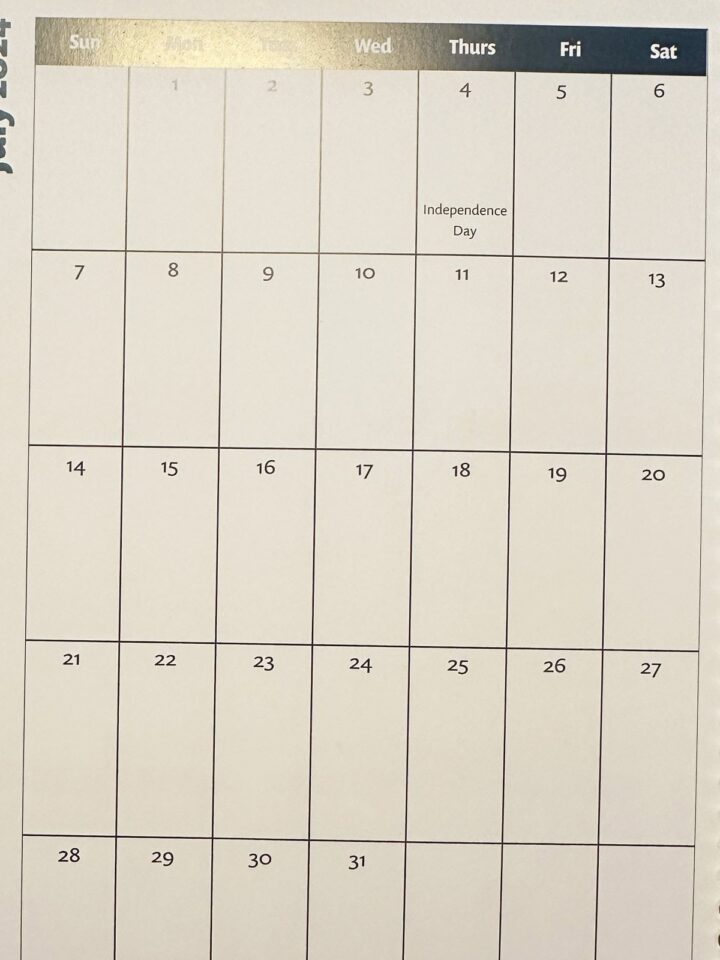
Add self-care routines
Then, adding the different self-care routines to the monthly calendar on the Notes page will remind you what you want to keep track of. For example, maybe you want to work out three times a week. All these activities will help you see the openings in your month and where to fill them with homework and self-care.
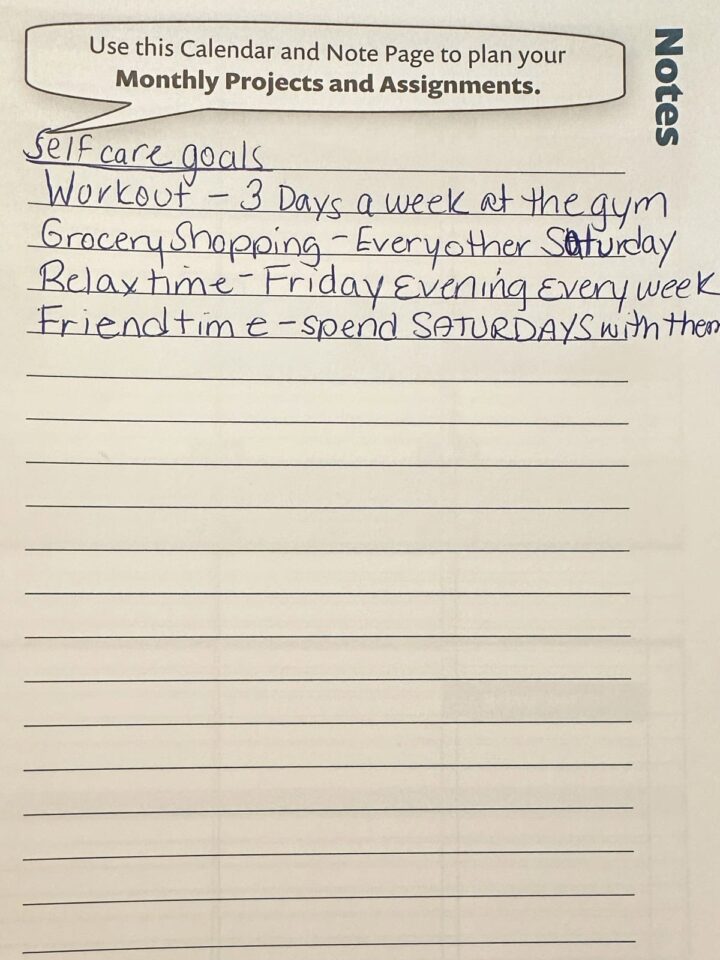
Once a week, assign time for different activities
Now that all the activities have been added to your monthly calendar, Sometime before the week starts, you would add the specific tasks and the self-care routine (affiliate) to your schedule for each day of the week, blocking out time for each activity.
You can also color-code your activities with highlighters (affiliate). Some popular highlighter colors that will not make it difficult for you to read are Yellow, Pink, and Green. Blue is a little dark for you to see what you wrote.
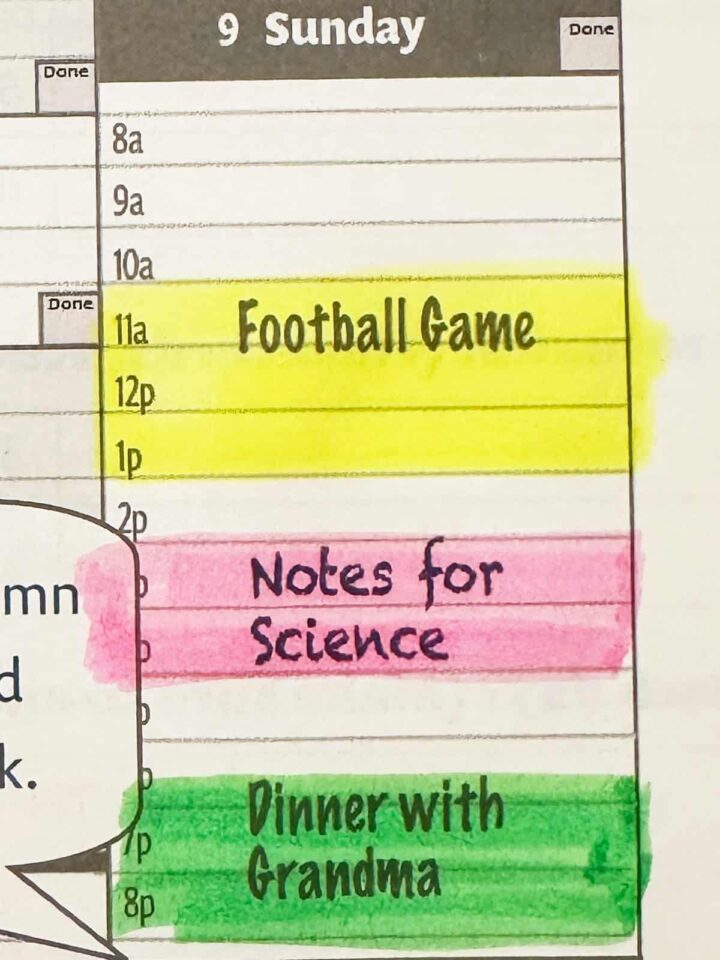
It is time to finish your tasks each day without falling behind.
Tips for blocking enough time for tasks
The trickiest part of blocking out the right amount of time is allocating enough time for each activity. Below are some times to figure out your required allotted time.
How much time does it take to do ....?
- College Sports: At least 3.5 hours if you are watching the game, and an extra 2 hours if you are playing in the game.
- Theater or concert activities: These activities usually take 4 to 8 hours, depending on the part of the play you are in and how close it is to the show date.
- Walking across campus: This ranges depending on your college or university size. To find this out, set your phone to timer and walk until you get to your farthest class. This will give you a good idea of the maximum time it will take for you to walk to that class and your other classes.
- Spending time with friends and family: This meeting can last two to six or more hours, depending on how often you see the person and what you are doing.
- Going to the movies: Check the movie's length and add at least 20-30 minutes to that time, plus the travel time.
- Non-science homework: It depends on if it is a non-science or science course. For every 3-credit non-science course, you should allocate at least 6 hours to study per week.
- Science homework: For every 4-credit science course you take, you should average 12 hours of study time per week. For maximum retention, a 1-2 hour at a time working, then adding a 5-minute break every half an hour works nicely.
- Errands: Depending on the errand, how close it is to you, and whether you need to make an appointment with others to do it, it can take anywhere from 1 hour to several hours.
As you can see, these items may vary in time, and several factors determine the length of time. Be patient when determining the time. It is not a perfect science, so you may need to adjust as you figure out how long tasks take to do.
Conclusion
Setting up an academic planner (affiliate) focusing on self-care and academic success will help students develop healthy habits after college. I hope this Organizing College Student Self-Care post motivates you to draw attention to the importance of good mental health.
Feel free to visit my other college student tips posts!
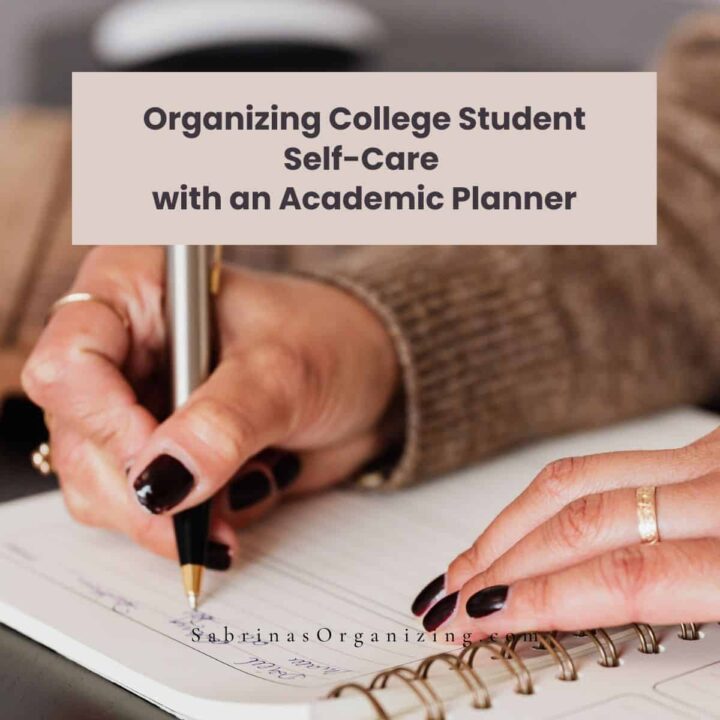
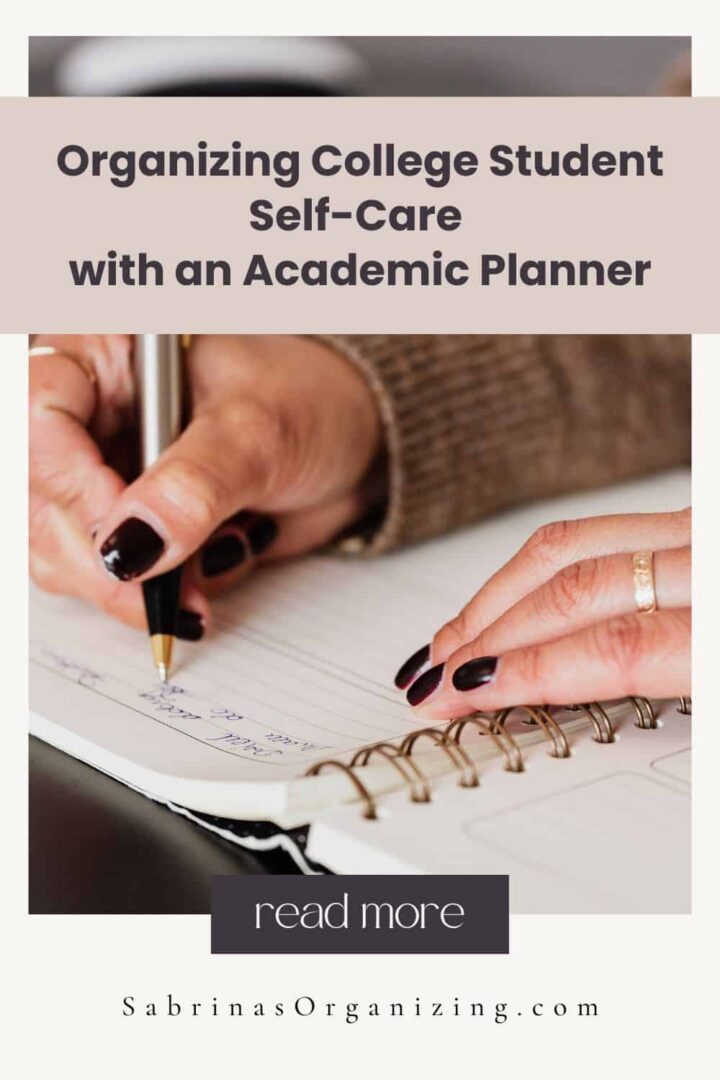









Janet Schiesl says
I love the idea of adding self-care to your calendar. I imagine that is hard for college students. Planning ahead and writing it down makes a lot of sense. It's a skill that kids need to learn before going to college.
Seana Turner says
I really love this post because you expound on all the ways we can use a planner. I think most people tend to think of a planner as simply a place to list "work" we have to do. Of course, a planner is great for this. But it can hold so much more. I sort of consider my planner my friend, a place to capture and contain and record so many different types of things. Just today I was jotting down a gift idea because I heard my mother say something she wanted. Since my planner was nearby, I was able to grab that idea.
I know people can do this on their digital devices as well, but the paper is just quick and easy for me - no wifi required. 🙂
Sabrina Quairoli says
Thanks for stopping by and commenting, Seana! I really appreciate your comments. =)
Linda Samuels says
When the kiddos go off to college, it can easily be their first experience managing life independently. No parents to cue them. Having a handle on managing time, tasks, self-care, and more is essential.
I love your guidance and suggestions using the Order Out of Chaos planner and accounting for transition time. It takes practice to figure things out, but having tools that work well is a great support.
Sabrina Quairoli says
Thanks for stopping by Linda, I really appreciate it. =)
Diane N Quintana says
It's a great idea to schedule self-care tasks into the planner. Teaching college-age students to create this habit will serve them well the rest of their lives. We all know about scheduling appointments but we rarely schedule things we want to do for ourselves. It's a lesson all of us need to take to heart.
Sabrina Quairoli says
I totally agree, Diane! Thanks for stopping by and commenting. =)